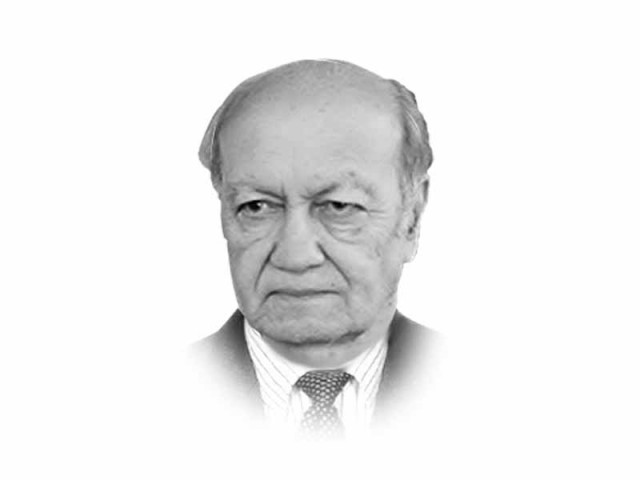Resetting relations with neighbours
It is now an appropriate time to revisit relations with neighbours with region in the midst of transformative moment.

The writer is a retired lieutenant general of the Pakistan Army and served as chairman of the Pakistan Ordnance Factories Board
Our rivalry with India is rooted in several factors, foremost being the unresolved issue of Kashmir, lingering fear of its hegemonic designs and competing views of nationalism. Besides, Pakistan’s use of asymmetric forces to countervail India’s economic and military preponderance led to India’s contention that Pakistan breeds and exports terrorism. This perception was exploited after 9/11 and got deeply embedded in the Indian psyche after the Mumbai terrorist attack that is alleged to be masterminded by the LeT and secretly supported by elements in the establishment. Nuclear rivalry is another source of tension and distrust.
Despite Pakistan’s sincere efforts to allay Afghanistan’s misgivings, deep distrust characterises the relationship. Kabul refuses to accept the Durand line as the international boundary. The Afghan perception is that Islamabad pursues a dual policy of seeking good relations, while supporting the Taliban directly or discreetly. Unless the insurgency in Afghanistan subsides, Pakistan will remain a villain in the eyes of Afghans. India’s growing influence in Afghanistan, especially close links between their militaries and intelligence agencies, further complicates matters.
Interestingly, Iran and Pakistan consider each other rivals as well as partners in the region. Relations frequently run into trouble with Tehran blaming Islamabad for not being able to contain sectarian violence and not managing the border efficiently. Pakistan could become a battleground for proxy wars between Saudi Arabia and Iran. Another major area of divergence with Tehran is that both see each other supporting rival groups in Afghanistan. Prospects of a breakthrough between the US and Iran on the nuclear issue will hopefully provide relief for Pakistan. A classic demonstration of this indecisiveness is reflected in the way our governments have been vacillating on the Iran gas pipeline project. Moreover, permanent nuclear agreement between the US and Iran could invite the ire of Saudi Arabia with consequences for Pakistan.
China remains an exception as a neighbour with which Pakistan enjoys a close and fraternal relationship. There is considerable strategic convergence on major global and regional issues. There is a broad consensus within political parties and between the military and civilian leadership to forge close ties with China. This relationship also acts as a countervailing force against India’s military and economic preponderance. Pakistan and China will continue to develop strong military, economic, trade and infrastructural links. However, China’s support will be more qualified than in the past due to its expanding global interests and concern about growing militancy in Pakistan and its adverse impact on its Muslim population in Xinjiang.
Despite the great challenges that Pakistan faces, serious efforts should be made in resetting our relations with our neighbours. Prime Minister Nawaz Sharif has been consistent in his desire to improve relations with all neighbours. It has been a part of his party manifesto and his personal commitment as well. He realises the benefits that will accrue by its positive impact on the economy and the security situation. Recent history of the European Union and the ASEAN has demonstrated that when neighbouring countries cooperate with one another and seek common goals, individual countries and the region benefit enormously.
However, it would be unrealistic to assume that complete transformation in relations with neighbours could take place in a short span of time. First, because the problems are deep-rooted as explained above and then relations are a two-way traffic. If the other side is disinclined and considers it inappropriate to improve relations for its own reasons, there is not much that can be done, as we are witnessing in the attitude of India. Similarly, President Karzai’s behaviour has been an impediment to building a stable relationship. Despite these difficulties, there are some hopeful signs as India, Afghanistan and Iran are all interested in expanding trade and economic linkages with Pakistan. As India and Pakistan moved towards trade normalisation, two-way trade between them increased by 21 per cent to $2.4 billion in 2012. Bilateral trade with Afghanistan has also increased to $2.5 billion and is targeted to reach $5 billion by the end of 2015.
It is now an especially appropriate time to revisit relations with neighbours. The region is in the midst of what could be described as a transformative moment. With Karzai’s departure and an encouraging turnout in Afghanistan’s presidential elections, a new relationship can be forged with the new leadership. The perception, however false it may be, that Pakistan interferes in Afghanistan’s affairs needs to be erased through more transparency. Similarly, Indian elections also provide an opportunity to improve relations. In Iran, too, there has been a change of guard and President Rowhani is a moderate leader seeking better relations with the US and neighbouring countries. Islamabad should restore the confidence of the Iranian leadership by ensuring effective border management and staying away from proxy wars in the Middle East. Pakistan’s future is linked to globalisation and the international system. If it strictly conducts itself and adopts norms that facilitate that process, it will also contribute to building trust with neighbours.
Published in The Express Tribune, April 9th, 2014.
Like Opinion & Editorial on Facebook, follow @ETOpEd on Twitter to receive all updates on all our daily pieces.















COMMENTS
Comments are moderated and generally will be posted if they are on-topic and not abusive.
For more information, please see our Comments FAQ